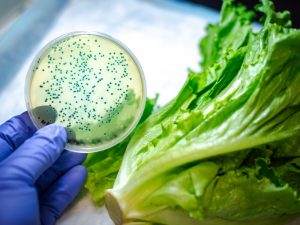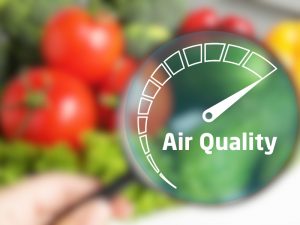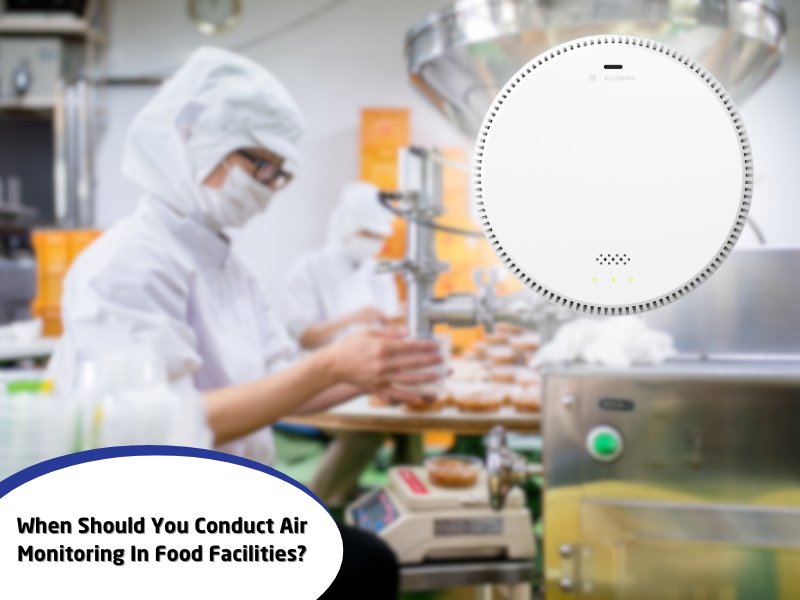Maintaining high air quality in food facilities is crucial for health and safety. Air monitoring helps identify potential risks that could compromise food quality. This article discusses why air quality is essential in food facilities, the consequences of poor air quality when conducting air monitoring, how it can enhance food quality, factors to consider when selecting an air monitoring solution, and how Edimax can support your air monitoring needs.
Why is air quality important in food facilities?
Air quality is crucial in ensuring food safety and employee well-being within food facilities. Here are several vital reasons why maintaining high air quality is essential:
- Health standards: Clean air is fundamental in meeting health regulations and standards established by local authorities. Compliance with these standards protects public health and your business against legal repercussions.
- Food safety: Poor air quality can lead to the contamination of food products, which can have severe consequences for consumer health. Harmful airborne particles, allergens, or pathogens can quickly settle on food surfaces, posing risks compromising food safety.
- Employee comfort: A pleasant working environment maintains high employee morale and productivity. Good air quality, characterised by adequate ventilation and the absence of pollutants, contributes to the overall comfort of staff. When employees feel comfortable, they are more likely to be engaged and perform at their best.
- Regulatory compliance: Regular air quality monitoring helps ensure compliance with industry regulations, which can vary by sector. Adhering to these regulations is crucial in avoiding legal issues arising from non-compliance, such as fines or business shutdowns.
- Product quality: Optimal air quality is essential for preserving the quality and freshness of food. Air quality influences factors such as humidity levels and temperature control, impacting everything from the shelf life of products to their taste and appearance. By maintaining high air quality, food facilities can protect their reputation and enhance customer satisfaction.
What are the potential consequences of poor air quality in food facilities?
Failing to monitor and manage air quality in food facilities can result in severe repercussions beyond regulatory compliance. Here are some of the critical consequences:
- Food contamination: Harmful airborne particles, including dust, bacteria, and allergens, can settle on food products. This contamination can lead to spoilage and foodborne illnesses, putting consumers at risk and damaging your brand’s reputation.

- Increased pest activity: Poor air quality often attracts pests such as rodents and insects, posing significant threats to food safety. These pests can carry diseases and contaminate food, leading to potential health hazards and costly pest control measures.
- Health issues: Employees working in environments with poor air quality may experience respiratory problems, allergies, and other health concerns. These health issues can increase absenteeism and turnover, further disrupting operations and increasing hiring costs.
- Reduced productivity: When workers are in unhealthy environments, their productivity can decline. Discomfort caused by poor air quality can lead to decreased focus and motivation, ultimately affecting overall operational efficiency and performance.
- Financial losses: Contaminated food products can lead to costly recalls, resulting in direct economic losses and tarnishing your facility’s reputation. A damaged reputation can lead to decreased consumer trust, reduced sales, and long-term financial implications.
When should you conduct air monitoring in food facilities?
Air monitoring should be a routine part of your food facility management. Here are vital times to conduct air monitoring:
- During production cycles: Regular monitoring during peak production times ensures optimal air quality.
- Post-contamination events: After any contamination incident, monitoring helps confirm the facility is safe for food production.
- After maintenance activities: Following cleaning or maintenance work, checking air quality ensures no harmful residues are present.
- Seasonal changes: Different seasons can affect air quality; monitoring during transitions helps manage risks.
- Before and after events: If hosting special events, monitor air quality before and after to safeguard food safety.
How can air monitoring help you improve the quality of your food facility?
Implementing air monitoring provides numerous benefits for your food facility:
- Identifying contaminants: Continuous tracking helps identify airborne contaminants early, allowing prompt action.
- Data-driven decisions: Historical data from air quality monitors supports informed decision-making for improving air quality.
- Enhanced safety protocols: Regular air quality checks reinforce safety protocols and staff training efforts.
- Boosting compliance: Keeping track of air quality helps ensure ongoing compliance with health and safety regulations.
- Improving operational efficiency: Good air quality can enhance operational efficiency and productivity.

What factors should you consider when choosing an air monitoring solution?
Selecting the proper air monitoring solution involves several considerations:
- Sensor capabilities: Look for comprehensive monitoring capabilities, such as the 10-in-1 sensor features of the Edimax AI-2005BE.
- Real-time alerts: Choose a system that offers real-time alerts and remote monitoring for proactive management.
- Integration ease: Ensure the solution easily integrates with your existing systems and processes.
- Data reporting: Consider options that provide insightful data and reports for ongoing air quality management.
- Security features: If relevant, select a monitor with security features like vape and THC detection, especially for sensitive environments.
How can Edimax help you with your air monitoring needs?
Edimax offers an advanced air quality monitoring system to improve indoor air quality in food facilities. Here’s how Edimax stands out:
- Comprehensive monitoring: The Edimax AI-2005BE Air Quality Detector measures multiple air pollutants, ensuring thorough oversight.
- Real-time alerts: Receive immediate notifications via mobile app, allowing quick responses to air quality issues.
- Easy integration: The detector seamlessly integrates with existing air circulation systems, simplifying setup.
- Data-driven insights: Generate historical reports that provide valuable insights into air quality trends and improvements.
- Customised support: Edimax offers consultation and installation services to tailor air monitoring solutions to your needs.
Elevate your air quality management with Edimax!
Effective air monitoring is vital for maintaining high standards in food facilities. Edimax can help you navigate this process with advanced air quality detection solutions. Ensure optimal air quality today to enhance your facility’s safety and efficiency.
For more information about how the AI-2005BE can benefit your food facility, request a consultation with Edimax and discover tailored solutions that fit your needs.
